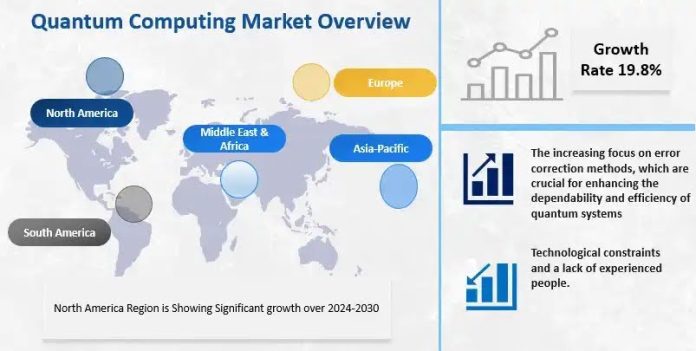Quantum computing is no longer a futuristic concept; it is becoming a reality, rapidly transforming industries like healthcare, finance, cybersecurity, and beyond.By leveraging the principles of quantum mechanics, quantum computers process data in ways that traditional computers cannot, opening up new avenues for problem-solving and innovation. Quantum computing holds great promise in drug discovery, materials science, cryptography, and optimization. By performing calculations at a speed unattainable by classical systems, quantum computers can simulate molecular structures, optimize supply chains, and break cryptographic codes.
Growth Avenues and Strategic Openings
Quantum computers excel in solving problems such as drug discovery and optimization, which classical computers struggle with. Also, governments and tech companies are heavily investing in quantum research to maintain a competitive edge. Progress in quantum hardware, error correction, and software is making quantum computing increasingly practical. Moreover, quantum-as-a-service platforms, AI integration, and hybrid systems offer exciting possibilities for industries. However, high costs, technical issues like qubit coherence, and a shortage of skilled professionals are barriers to broader adoption.
Quantum Computing’s Real-World Applications
The commercial applications of quantum computing are vast. In the healthcare sector, quantum algorithms are accelerating drug discovery, significantly reducing research times. Financial institutions are exploring quantum computing for portfolio optimization and risk modeling, while cybersecurity experts are working on creating quantum-resistant encryption systems to safeguard sensitive data in the age of quantum computers.
As the technology continues to mature, its influence will only expand. Quantum computing promises to not only solve existing problems more efficiently but also create new possibilities that were previously unimaginable.
IBM Unveils Quantum Hardware and Software Advancements at Developer Conference
In November 2024, IBM has announced significant advancements in quantum computing at its inaugural IBM Quantum Developer Conference. The company introduced IBM Quantum Heron, its most performant quantum processor to date, capable of executing quantum algorithms with up to 5,000 two-qubit gate operations. This leap in quantum processing enables users to explore complex scientific challenges in fields like chemistry, life sciences, and high-energy physics. The updated capabilities are a major milestone in IBM’s Quantum Development Roadmap, bringing the company closer to achieving quantum advantage by 2029.
Google Achieves Quantum Supremacy with Latest Breakthrough
Google has achieved a significant milestone in quantum computing, having demonstrated quantum supremacy in a groundbreaking experiment. The company’s quantum computer recently solved complex mathematical problems in mere seconds, tasks that would take classical supercomputers thousands of years to complete. With quantum supremacy, Google has accelerated the timeline for using quantum computing to address real-world problems like optimization, drug discovery, and artificial intelligence. The success marks a major leap in the development of quantum technologies, demonstrating how quantum computing handle challenges that would otherwise be impossible for classical systems to tackle.
Government Investments in Quantum Computing Surge Globally
Governments worldwide are ramping up investments in quantum computing research and development, recognizing its potential to drive technological and economic growth.
On 26 July 2024, the UK’s Department for Science, Innovation, and Technology (DSIT) announced a £106 million funding boost for five quantum research hubs in Birmingham, Edinburgh, Glasgow, London, and Oxford. These hubs will focus on developing cutting-edge quantum technologies, including quantum sensors for disease diagnosis, creating a secure “quantum internet,” and advanced positioning systems for national security and critical infrastructure.
In parallel, the US Government has continued to ramp up its investment in quantum technology, allocating a total of $3.1 billion to quantum research from 2020 to 2023. The latest funding, which includes $968 million for the National Quantum Initiative (NQI), supports a range of federal agencies and the creation of 14 Quantum Information Science Centers. The US is also pushing forward with a new bill that would authorize the use of AI in quantum science.
Collaborative efforts between the two countries are also growing, with the Cleveland Clinic and IBM partnering to leverage quantum computing for advancements in healthcare. Their initiative, backed by £210 million in funding, aims to apply quantum technologies to global healthcare challenges.
About Author:
HTF Market Intelligence Consulting is uniquely positioned to empower and inspire with research and consulting services to empower businesses with growth strategies, by offering services with extraordinary depth and breadth of thought leadership, research, tools, events, and experience that assist in decision-making.


